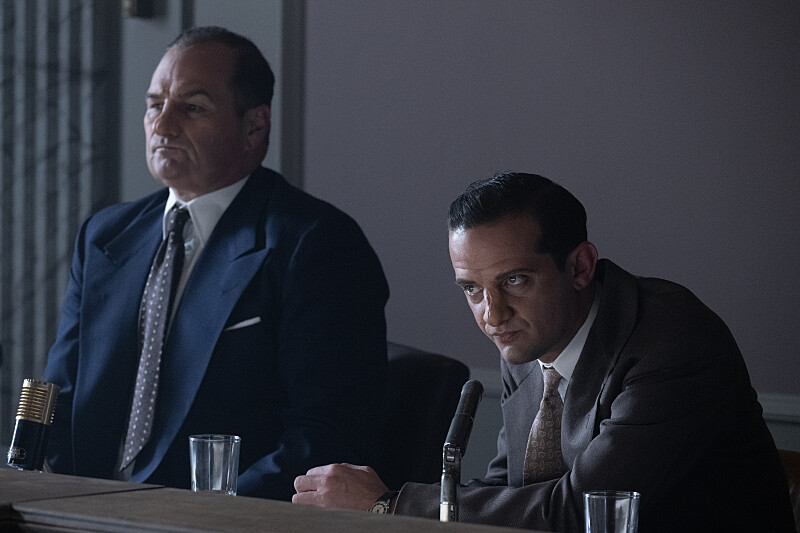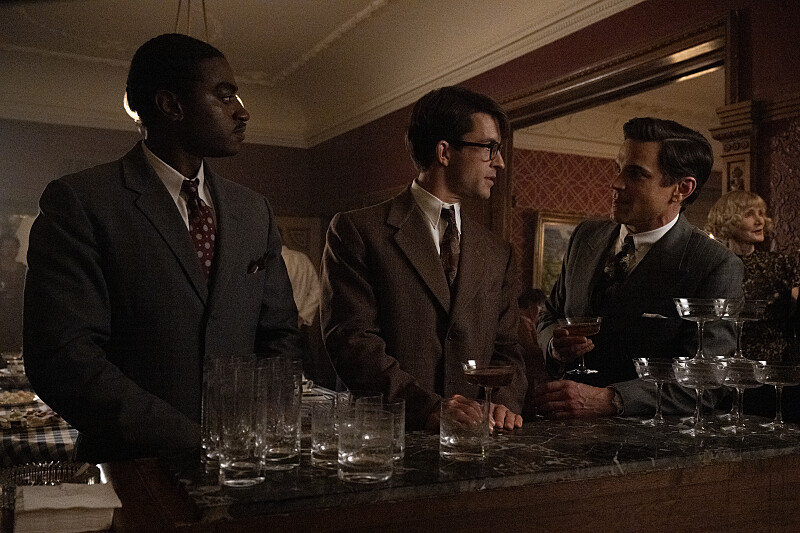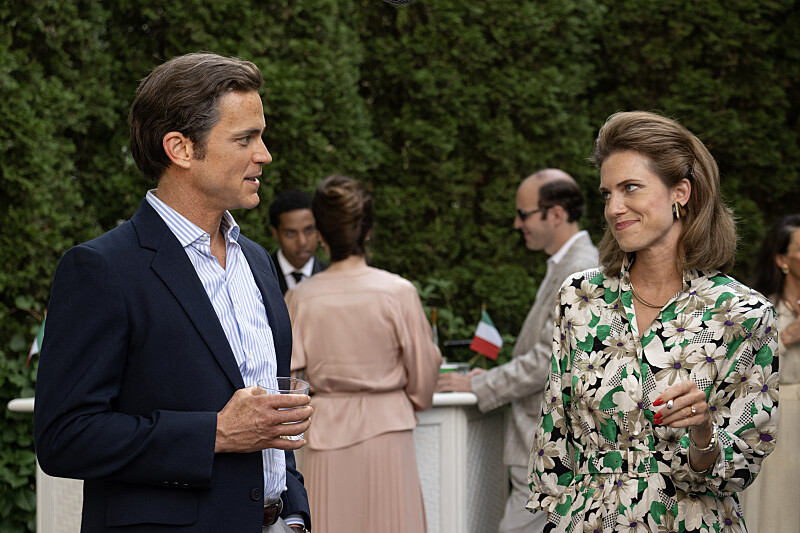On April 27, 1953, the federal government declared war on its queer employees. President Dwight D. Eisenhower’s Executive Order 10450 authorized a witch hunt for workers who engaged in, among other activities deemed to be national security risks, “sexual perversions.” Thus began what historians later dubbed the Lavender Scare, a less publicized but similarly devastating sequel to the Red Scare thought to have resulted in between 5,000 and 10,000 gay men and lesbians losing their livelihoods. Some investigations ended more tragically, in suicide.
It’s just months before the order drops that the sometime lovers at the center of Showtime’s lively, insightful, and often devastating historical drama Fellow Travelers, adapted from Thomas Mallon’s acclaimed 2007 novel and premiering Oct. 27, first meet. Hawkins Fuller (Matt Bomer) is a shrewd D.C. operative with a surrogate father in the high-minded senator Wesley Smith (Linus Roache) and a potential match in Smith’s daughter, Lucy (Allison Williams). It doesn’t bother Hawk that he has to hide his anonymous encounters with other men. For him, life is a performance in which the ends justify the means. “I’m a registered Republican, but I don’t vote because I don’t see the point,” Hawk explains, adding that he feels the same way about religion.

He doesn’t believe in much of anything until Tim Laughlin, a young, fresh-off-the-bus transplant played by Bridgerton breakout Jonathan Bailey, comes into his life. (Even then, the word love isn’t in Hawk’s vocabulary.) Bursting with Irish Catholic earnestness, Tim dreams of helping his idol Joe McCarthy (Chris Bauer) save the world from the scourge of Soviet communism. At the same time, he’s desperate to overcome his queerness, in which he once guiltily dabbled, having been raised to believe that gay sex is a mortal sin. As a tryst evolves into something more, against both men’s better judgment, Hawk gets Tim—whom he nicknames Skippy, for his floppy-haired ingenuousness—a job in McCarthy’s office. There, he has a front-row seat to the audaciously hypocritical machinations of the senator and his deputy, Roy Cohn (a wonderfully weaselly Will Brill), as their assault on “un-American activities” invades the bedroom.
We know from the series’ very beginning how this dangerous romance is destined to end. The opening scene, set in 1986, frames Hawk and Tim’s affair—as well as the seamlessly incorporated stories of other queer characters, including a Black journalist (Jelani Alladin) and a lesbian couple (Erin Neufer and Gabbi Kosmidis)—as a flashback to the men’s youth. Three and a half decades later, Hawk is a distinguished grandfather celebrating a long-awaited diplomatic appointment in Milan with a party at his sprawling suburban mansion and Lucy by his side with big Nancy Reagan hair. Yet when he gets the news that Tim is dying of AIDS in San Francisco, he takes off for California, despite having reason to believe his old love doesn’t want to see him.

The parallel timelines take pressure off the narrative; viewers never get the chance to imagine that Hawk and Tim will live happily ever after. Instead, we’re left to discover what tore them apart, and when. The answers, and there are many, are grounded in the social and political realities of the eras Fellow Travelers traverses: the Lavender Scare ’50s give way to the radical ’60s, the debaucherous post-Stonewall ’70s, and the double devastation of the ’80s AIDS crisis and the Washington’s silence in the face of a plague that wiped out a generation of queer men.
But that’s not the whole story. Unlike the facilely noble queer (and trans and nonwhite and female) people who populate so much well-intentioned historical fiction, Hawk, Tim and their friends have distinctive, sometimes deeply frustrating, personalities. Hawk puts his career, and his long-term plan of moving overseas to live freely and wealthily, first. Destined to grow disillusioned with McCarthy, Tim finds new causes to which he becomes fervently devoted. And the men’s fates reflect the choices they make because of who they are. For the same reasons, each becomes the other’s great love, though they can’t help but disappoint one another.

Such specificity surely reflects thoughtful engagement on the part of creator Ron Nyswaner (best known as the writer of Philadelphia and an executive producer of Homeland) with Mallon’s novel. It’s also a great credit to Bailey and especially Bomer, whose boldly physical performances do as much as the scripts to reveal their characters. Hawk and Tim are repressed in public, yet behind closed doors their complementary desires come out. Always in control, Hawk asserts his dominance in bed. Tim submits not just because he’s younger and less experienced, but because it is in his nature to prostrate himself before love just as he does before God and McCarthy. Never sanitized in deference to the straight gaze, the sex is anything but gratuitous. The lovers’ power play serves to flesh out their compatibility, not paint them as deviants.
Fellow Travelers doesn't preach liberation. In its most romantic moments, the show does better: it embodies liberation. So much so that Nyswaner almost earns his jarringly sentimental ending. (You might groan, but unless you're dead inside, you'll also tear up.) Bomer, Bailey, and Alladin (though not, sadly, Williams) can even make you forget what a stretch it is to have a cast portray the same characters over the course of 34 years, with only some makeup and gray hair to mark the passage of time.
Nested within a case study of gay political life in the second half of the 20th century are eight episodes of gorgeous romantic drama in a medium that rarely seems suited to the genre. Savvy, selfish Hawk and self-sacrificing Tim are like magnets, but their views on how to survive in a world that hates people like them are mutually exclusive. With McCarthy and Cohn buzzing miserably in the background, Fellow Travelers poses the question that haunts every story of love lost and found: Can people evolve over time, or is it only their circumstances that change?
More Must-Reads from TIME
- Inside Elon Musk’s War on Washington
- Meet the 2025 Women of the Year
- The Harsh Truth About Disability Inclusion
- Why Do More Young Adults Have Cancer?
- Colman Domingo Leads With Radical Love
- How to Get Better at Doing Things Alone
- Cecily Strong on Goober the Clown
- Column: The Rise of America’s Broligarchy
Contact us at letters@time.com